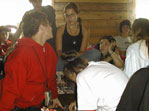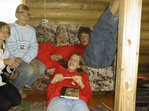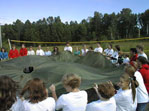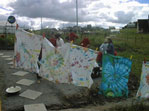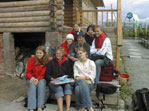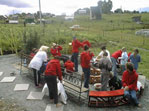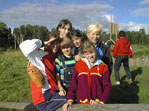|
Зная English, вы сможете прочитать статью о проекте Camp Siberia из американской газеты The Sun.
CAMP SIBERIA
Flamingos flocking to aid Russian orphans
Pat Andrews
For The Sun
Seen any flamingos lately?
You could, you know.
Flamingos are roosting in front yards all over Bainbridge Island and North Kitsap this spring. They settle in at night, stay for two days and move on.
The invading flocks come from - no, not Florida - but rather Siberia. Camp Siberia, that is.
Four dozen flaming pink plastic flamingos are helping 15 teenagers raise money to take an American-style summer camp experience to 30 orphans in Siberia this month.
For a $35 fee, the youth will "flock" a friend of your choice, quietly installing the silent birds in the yard in the dead of night. In the morning, the unsuspecting "flockee" steps out to see the long-legged birds grazing happily in a manicured lawn or garden.
"You've been flocked by Camp Siberia," reads the accompanying sign.
Camp Siberia was born last year, the outgrowth of a Bainbridge Island woman's five-year association with an orphanage in Novosibirsk.
A few days in the countryside, interacting with young people from another country, can be a life-changing experience for the orphans, Janie Ekberg believes.
Three years ago she purchased property outside of Novosibirsk, where local Russians go for summer holidays, and built a dacha to house the campers.
Last summer, she and 19 Bainbridge Island teenagers hosted 60 orphans at the first Camp Siberia, lugging sleeping bags for all the orphans, sports equipment from the annual Rotary Club auction, and supplies for activities and entertainment all the way from Washington to Siberia.
"The benefits are breath-taking," Ekberg says - for the Americans as well as the Russians. Friendships grew among the Americans last year that would never have happened otherwise, and individuals discovered new talents and interests within themselves, she said. Five teens from last year's group are returning this year.
Despite having the dacha, Camp Siberia is a camping experience in almost every sense of the word. The kids - Russians and Americans alike - share all the work. They also play sports, learn crafts and entertain one another with singing, story-telling and creative drama.
The only running water comes from a single hose. Water for bathing is heated over a wood stove and each camper gets a small bucketful. Most importantly, Ekberg says, they exchange experiences one-on-one.
Camp Siberia counselors leave for Novosibirsk on June 24. Among the supplies they will be taking this year are yarn, knitting needles and a donation of blue jumpers formerly worn by the Northwest Girls Choir in Seattle. The youths return July 12.
Ekberg's long-range vision is for Camp Siberia to become an annual event and to grow beyond her circle of contacts and the single two-week camp she now coordinates.
Already that seems to be happening: Support came this year from beyond the local community, including a first-grade class in California that earned money through bake sales and purchased art supplies for the camp. Other out-of-state organizations are looking into holding similar events at the dacha, which is accessible and could be used from April to September every year.
In the meantime, the Bainbridge group's two 24-bird flocks have been in almost constant use, said Allison Ekberg, Janie Ekberg's daughter and co-coordinator, keeping teens and their adult assistants up late almost every night of the week. Money from flocking" and other fund-raising events helps defray the $2,700 each youth must raise for traveling expenses.
Anyone interested in a flocking may call (206) 842-7036.
Published in The Sun: 06/12/2002
|
|
 |










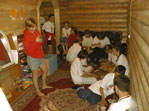
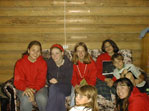
 ;
;